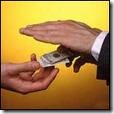 I watched the Arrington/Reback interview last week. It was quite interesting. Reback claims (and I agree) that competition is what ensures a fair marketplace. Without competition, consumers ultimately get burned.
I watched the Arrington/Reback interview last week. It was quite interesting. Reback claims (and I agree) that competition is what ensures a fair marketplace. Without competition, consumers ultimately get burned.
I was thinking about how this applies to lawyers in America. Does competition keep the legal industry in check?
Consider what would happen if tomorrow, the population of Accountants in the United States doubled. Suddenly there would be too many accountants. The price for accounting work would drop instantly due to over supply.
Now consider what would happen if tomorrow, the population of lawyers doubled. Unfortunately, there would be no such drop. A lawyer’s job is to make an argument (lawsuit). And we’ve created a government which has infinite capacity for new lawsuits. If there were twice as many lawyers filing claims, our government is *required by law* to expand to meet the needs of all those lawyers. Is this right?
According to this study, we can see the number of lawyers in America has sharply increased between 1970 and 2000. Was this growth due to increased demand for lawyers? Or do we have a supply/demand chain in the legal profession which is out of whack? Could it be that the same claims which Reback makes about businesses needing competitive pressure to remain balanced applies to lawyers? And if so, when we’ve got a government willing to accept any lawsuit, from any lawyer at unbounded capacity, how do we enforce competition in the legal industry?
The problem boils down to “frivolousâ€. Currently it is virtually impossible to get a case thrown out as frivolous. “Frivolous†is a specific legal term which has to do with making an grossly wasteful case. Generally, lawyers can make most any claim and sue anyone without being frivolous. This process can potentially cost the defendant hundreds of thousands of dollars to defend; and because it is so costly, defendants usually find it easier to settle, even for moderatly large amounts of $25,000 to $100,000. Even if the defendant is ultimately right and wins in court, the plaintiff owes the defendant nothing for all that wasted time. Further, the taxpayers were left with the bill for all the court costs. Why is this so? When bringing forth a lawsuit where you ultimately lose, why doesn’t the loser pay court costs and defendant costs? What other checks-and-balances can we put in place to provide the equivalent of “competition†in a legal system which inherently has no bounds on growth?
Unfortunately, our legal system is the pinnacle of the conflict of interest. Lawyers are one of the highest paid professions in the United States. Laws which regulate lawsuits will bring down lawyer wages. How can we expect politicians (largely lawyers themselves), judges, and lawyers to accept legislation which limits their livelihood? We cannot.
So, why does the public continue to elect LAWYERS to public office? They run the legislature, the judicial, AND executive branches of government…